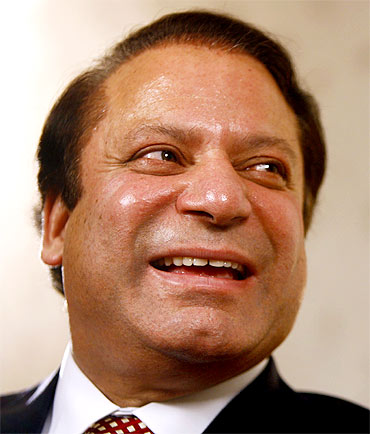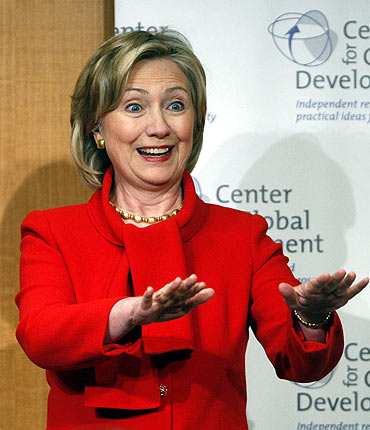Photographs: Luke MacGreg/Reuters
Former Afghanistan foreign minister Rangin Dadfar Spanta reportedly described former Pakistan prime minister Nawaz Sharif as 'the author of Islamic radicalism'.
A diplomatic cable released by whistle-blower website WikiLeaks quoted Spanta as saying, "We know Sharif is bad news. He is the author of Islamic radicalism in our region."
"Sharif could return to lead a movement that is pro-Islam and anti-US," the cable added.
UK paranoid about Obama
Image: US President Barack Obama with UK PM David CameronPhotographs: Reuters
Recent secret cables released by whistleblower website Wikileaks have revealed Britain's 'paranoia' about its so-called special relationship with the US.
In one cable, a senior US diplomat describes 'excessive speculation' by the United Kingdom after Barack Obama became President.
The BBC quoted the secret documents as saying that a 2008 cable written by US Deputy Chief of Mission Richard LeBaron describes a meeting with William Hague, then a UK Conservative frontbencher and now the country's foreign secretary.
On being asked at the meeting whether the relationship was 'still special', Hague reportedly replied, "We want a pro-American regime. We need it. The world needs it."
LeBaron further wrote, "More than one [UK] senior official asked embassy officers whether President Obama meant to send a signal in his inaugural address about US-UK relations by quoting Washington during the revolutionary war, while the removal of the Churchill bust from the Oval office consumed much UK newsprint."
"This period of excessive UK speculation about the relationship is more paranoid than usual," he added.
LeBaron further advised resisting the temptation to keep Britain 'off balance about its current standing with us' in order to foster greater assistance.
I have personally expressed my regret: Clinton
Image: US Secretary of State Hillary ClintonPhotographs: Kevin Lamarque/Reuters
Diplomatic cables are not part of the United States's policy and meant to just provide information which is not always accurate, Secretary of State Hillary Clinton has said, while acknowledging that the defence department did not handle properly the classified papers illegally obtained by WikiLeaks.
"Diplomatic cables are not policy. They are meant to inform. They are not always accurate. They are passing on information for whatever it's worth," Clinton told BBC.
"I think everyone knows that if we cannot speak openly and candidly with one another, we cannot understand each other and we cannot make policy that will benefit each other. I have found in my many conversations in the last week that there is certainly an understanding of what diplomacy means," she said.
"I have personally expressed my regret to individual leaders as well as publicly to anyone who has been offended or affected. But this is a tough business we're in, and it's a challenging world and most leaders get it," Clinton said.
"But they know that the policy of this administration is very clearly made in Washington by the President, by myself, by the rest of the high-level administration officials. And that's who they exchange views with and cooperate with on an ongoing basis," she said.




article